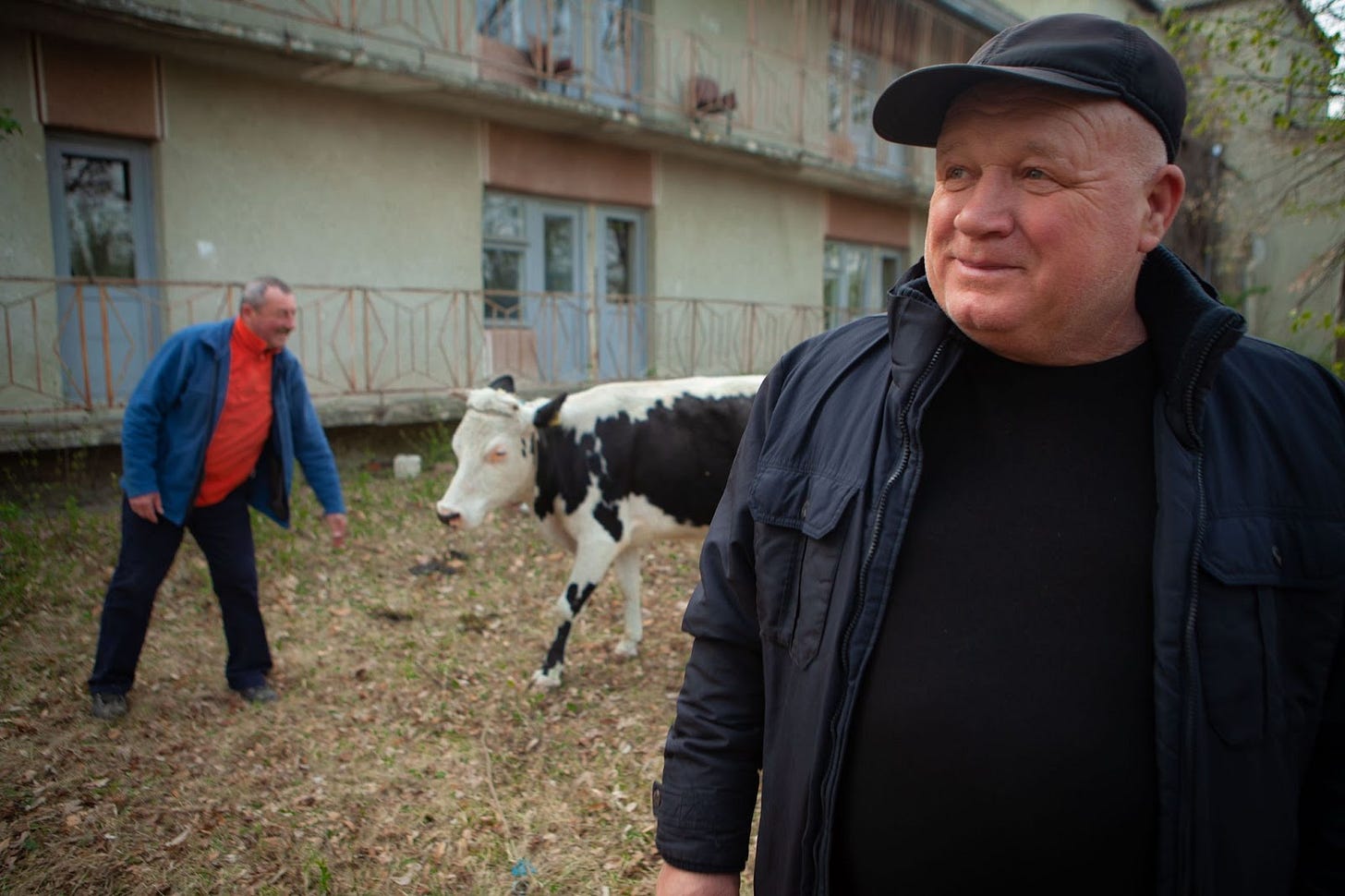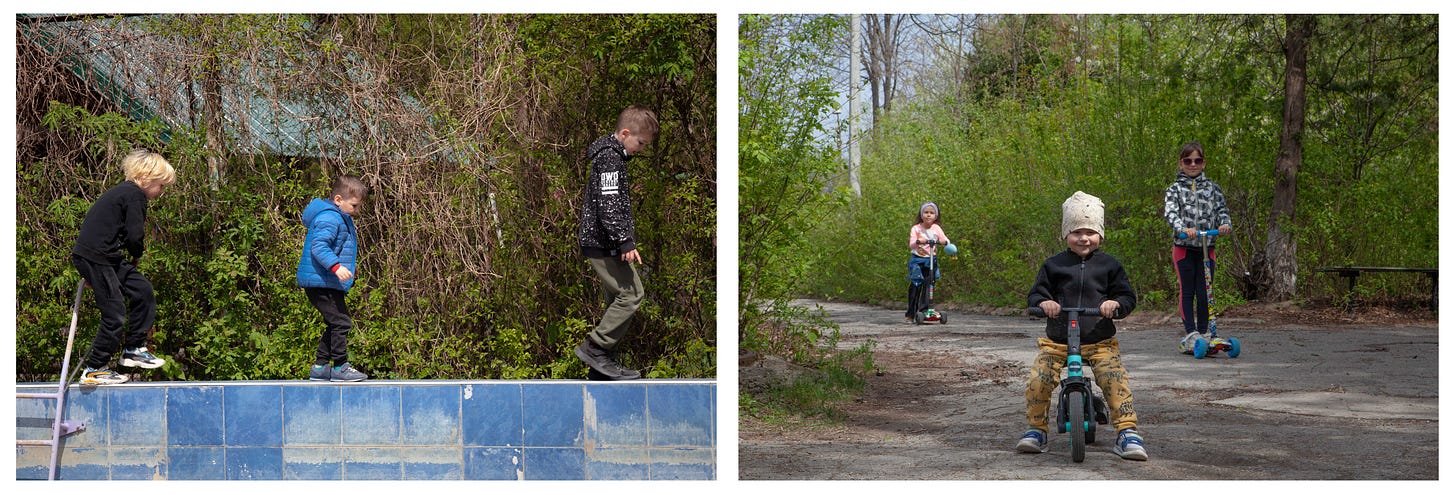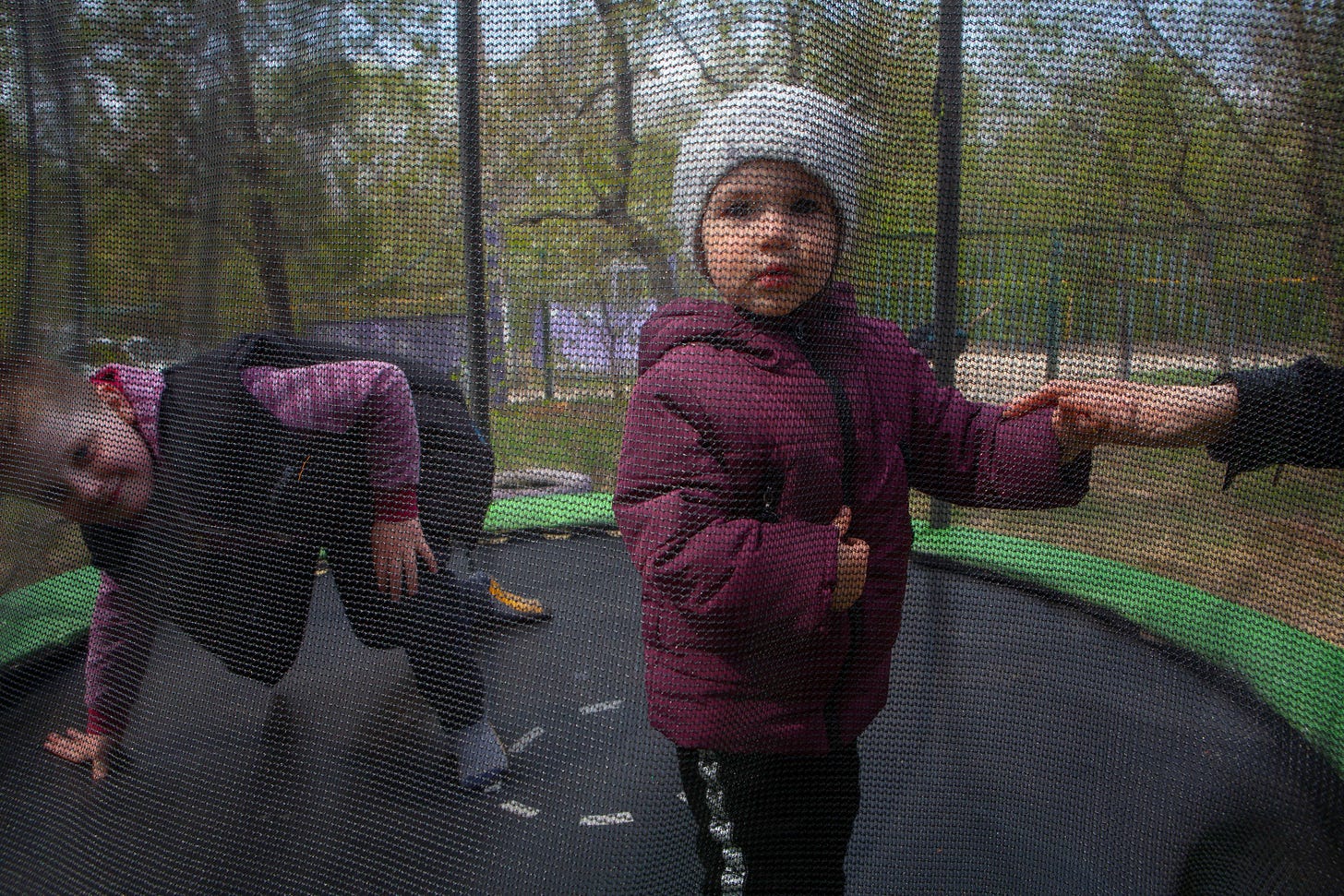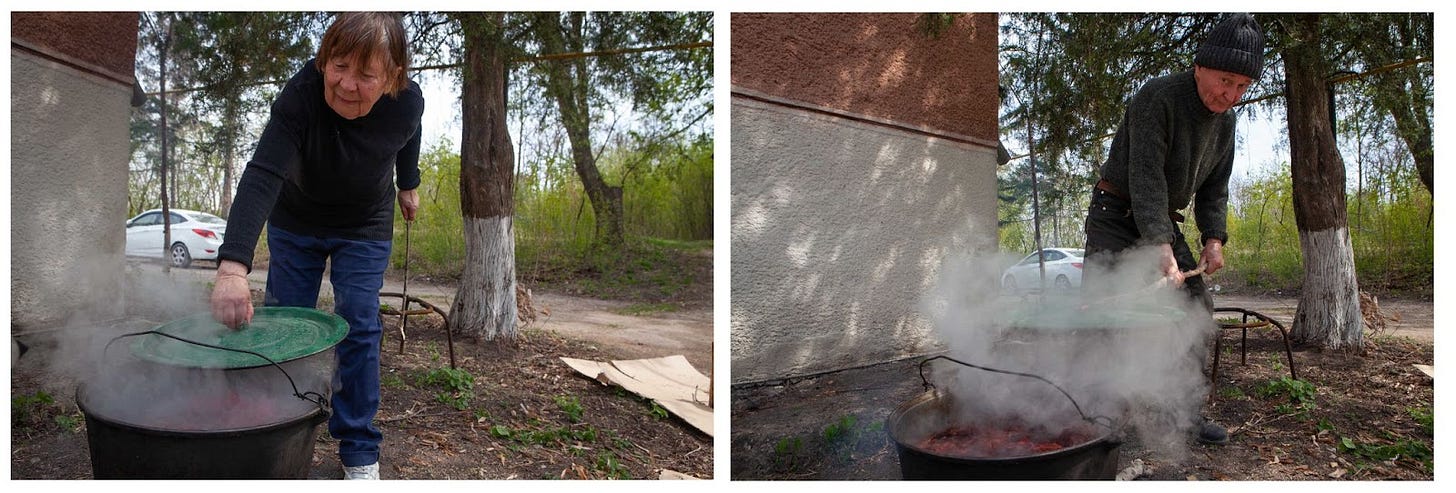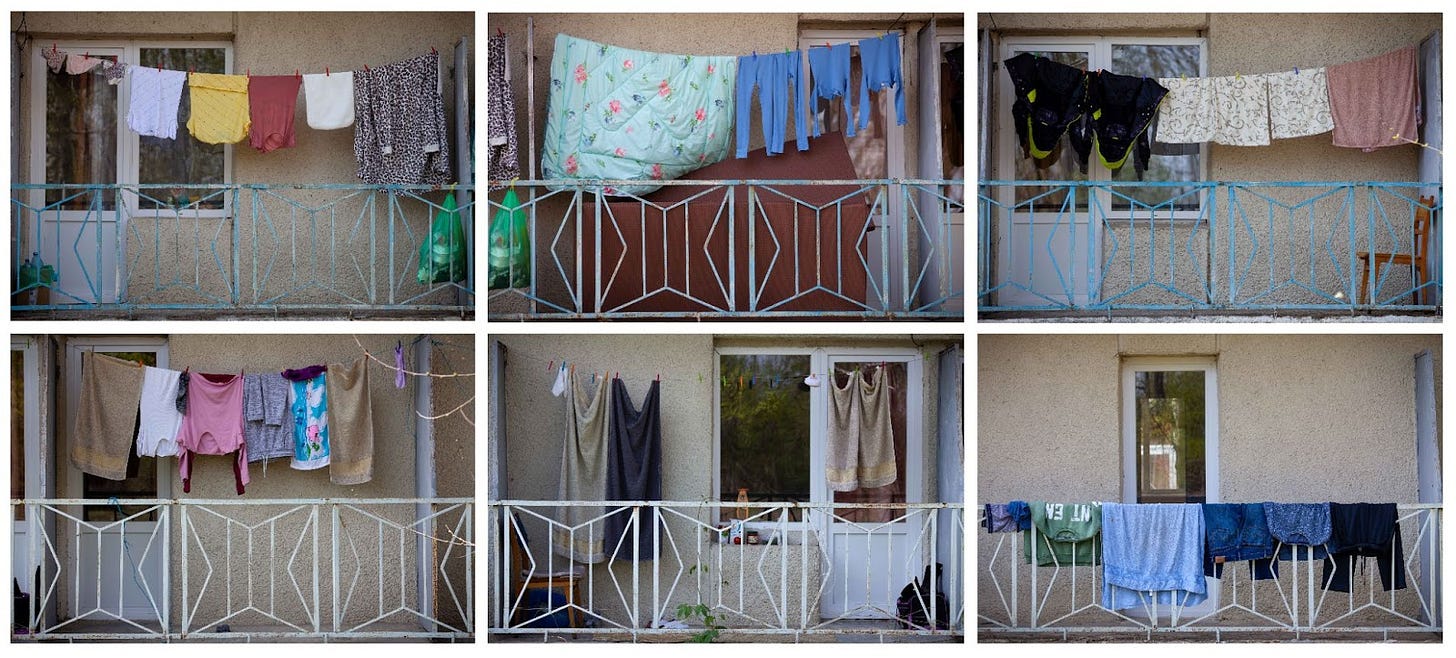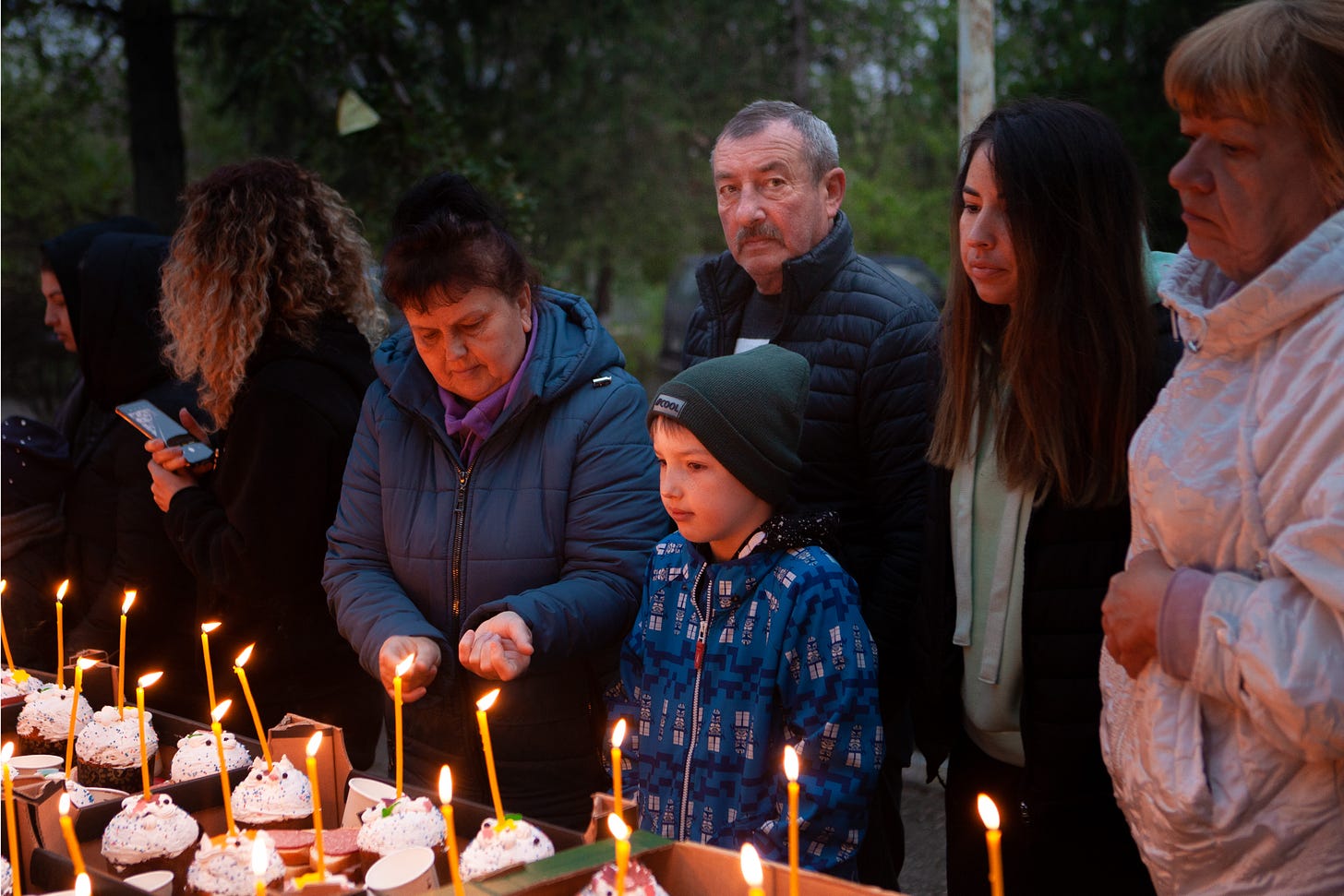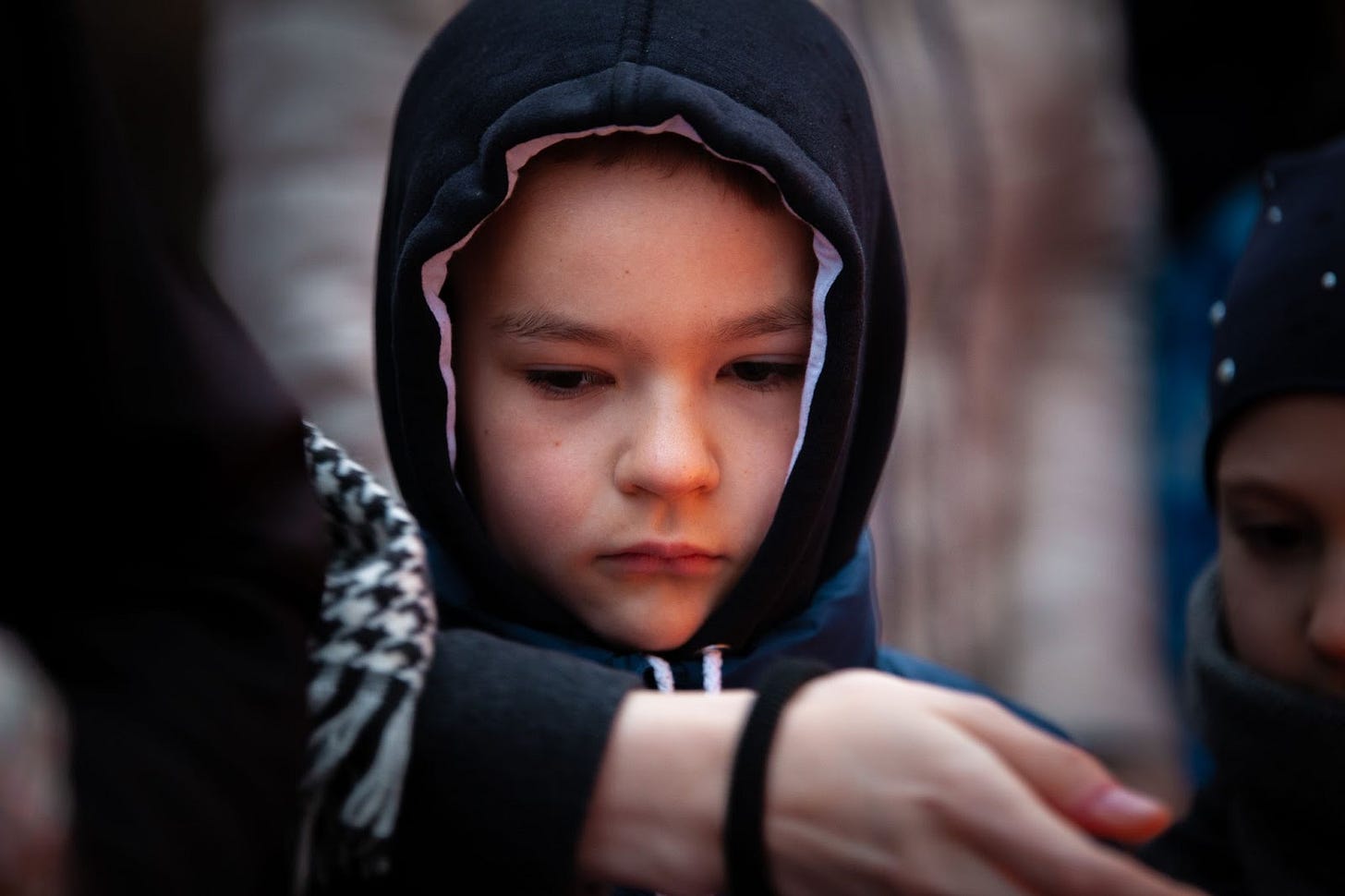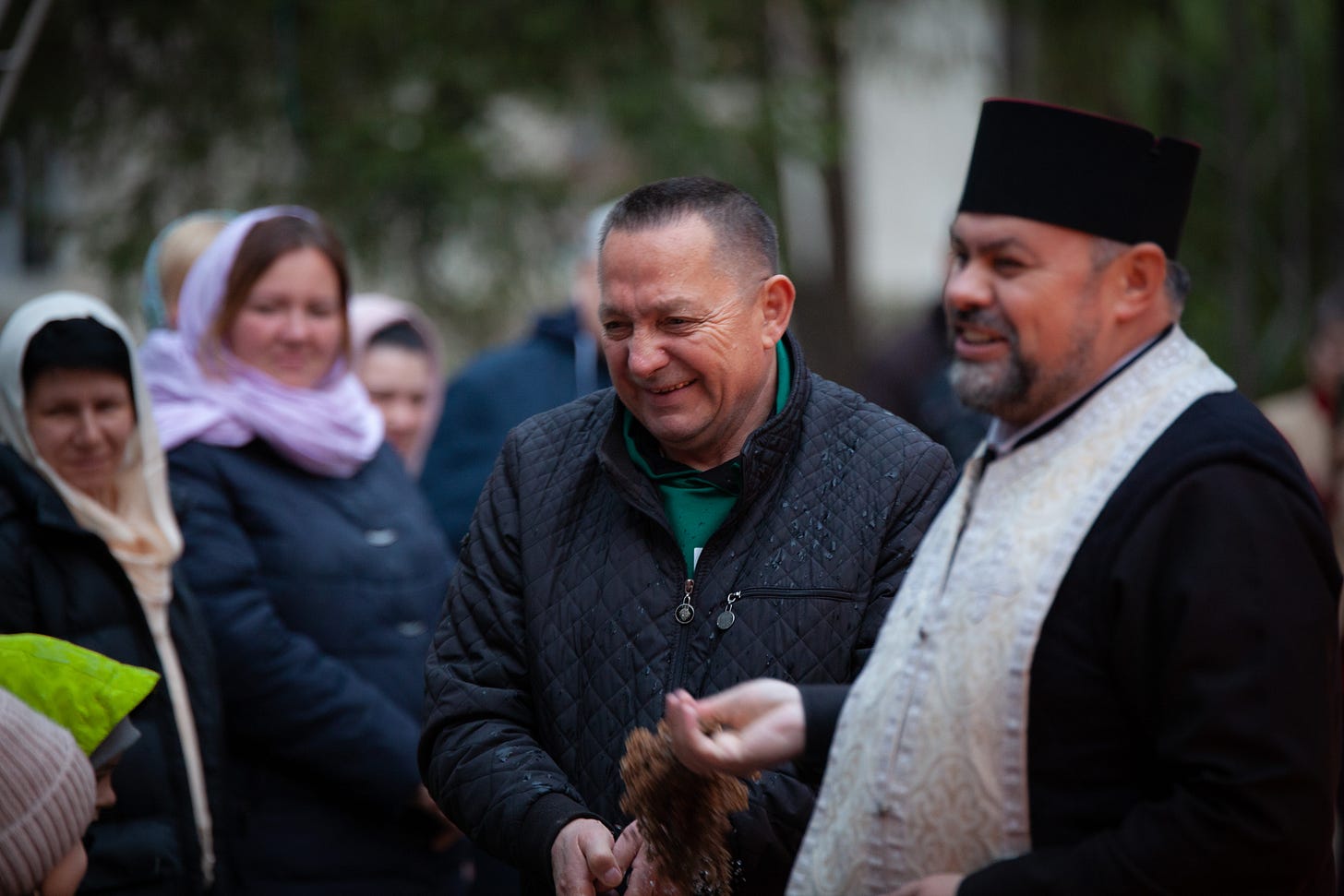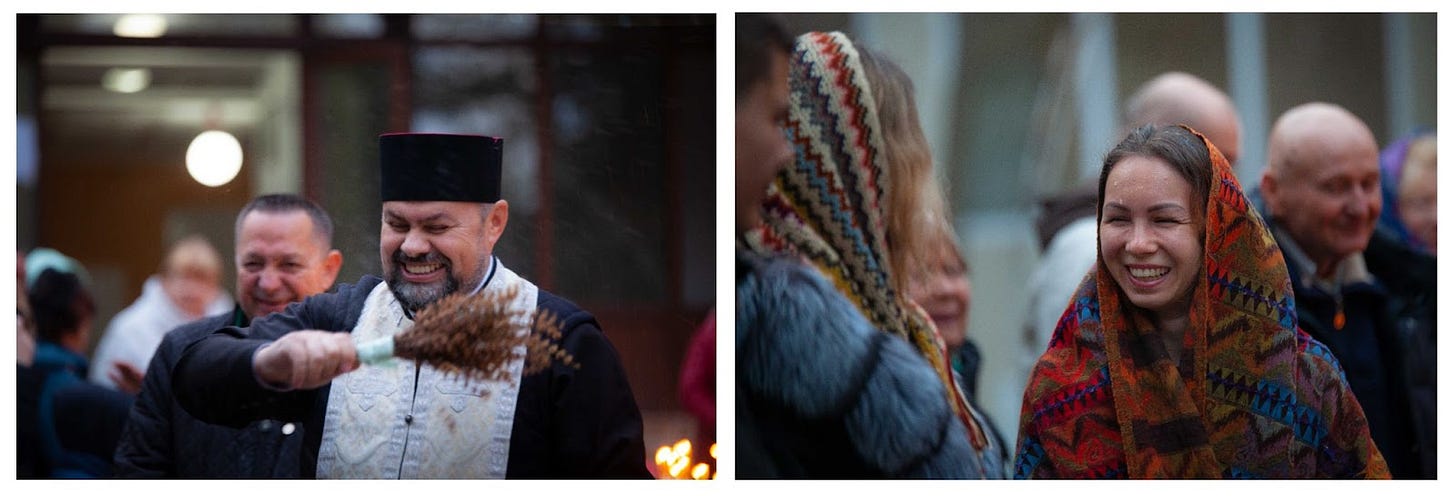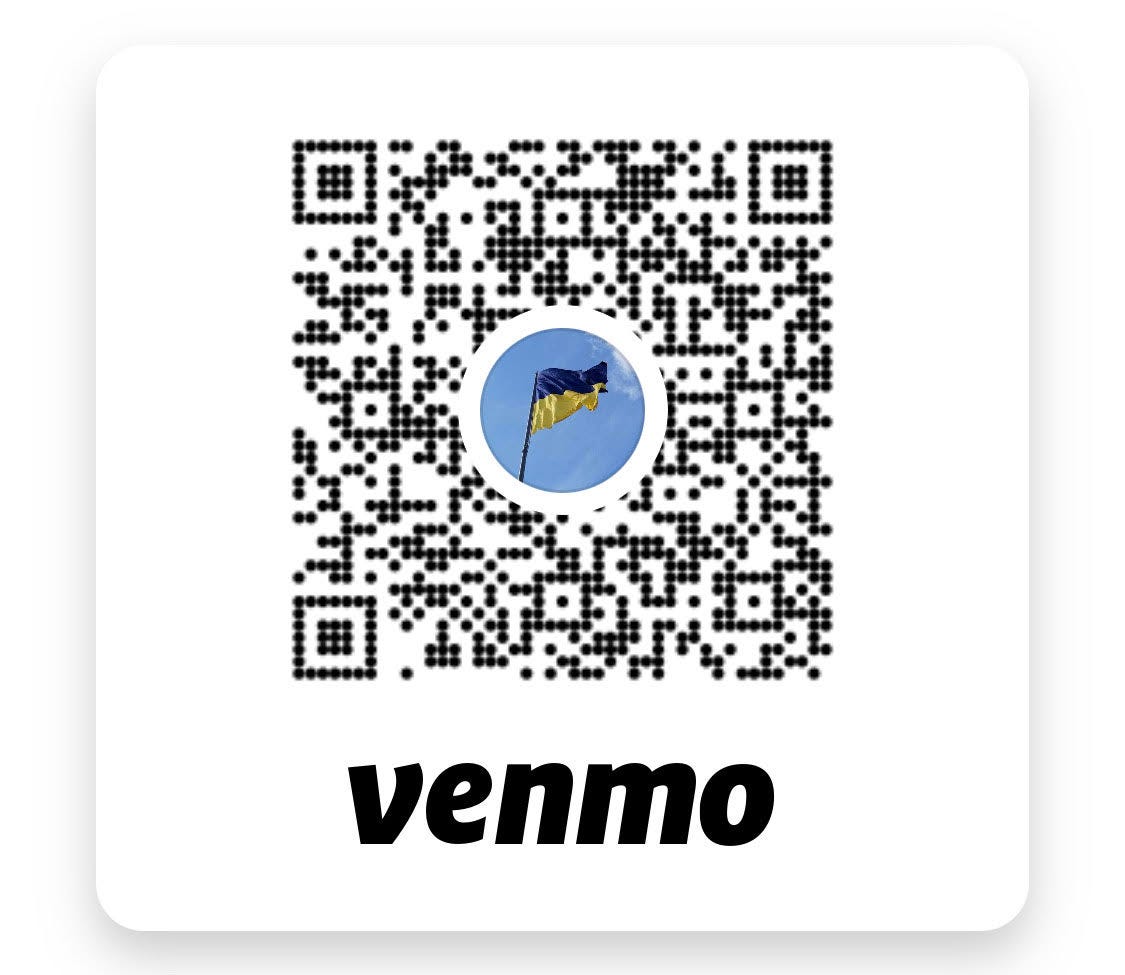Case study in caring: Holy cow
Writing and Photography by: Clary Estes. Edited by: Sharmishtha Rawat
It all started with a cow.
I sat at the Taproom 27 bar, IPA in hand, at the end of a day volunteering at the Smokehouse Refugee Resource Center in downtown Chișinău. It had been almost a month and a half since the Russian invasion of Ukraine, and Smokehouse was in its last days of operation. Yet, I had only just begun understanding the Ukrainian refugee crisis on the ground. Another volunteer and I had struck up a conversation. We talked about the insanity and frustration of the day, our own fatigue, and the still lingering disbelief that all of this was happening in the first place. Then they asked, “Did you hear about the cow story?”
I had not. That was the moment I caught wind of “Operation Moo.”
Ukraine on the hill
“SNAAAAKE!!!” I heard a young child yelling in Ukrainian. I look over to see three boys standing in a line along the raised blue tile edges of a drained Soviet-era pool. Weeds grew up over the gate, and one by one they passed a long stick to the boy in the back of the line. With it, the last boy prodded a pile of leaves that had built up along the corners of the tile. Slowly a long green-brown snake glided out from the pile into the brush: annoyed, but graceful. A chorus of screams erupted all around. The boys quickly stepped along the narrow tiles, moving as quickly as they could without running and falling into the concrete pit below.
The day was warm and sunny. The birds sang. Young girls careened across a broken pavement on their razor scooters. Their wheels made a click, click, click sound as they rolled over cracks. They wore fabulous, glittery, hot pink sunglasses and bright pink and multicolored camo tops that made them look like dazzling little women. As they swept down gentle slopes, they stuck their back legs up as if they were being kissed.
Other young children jumped up and down on an enclosed trampoline while parents held their hands to keep them upright. Surrounding them, grandparents, one earnest grandson, and a handful of volunteers raked the ground of dead leaves and piled them onto a burlap tarp before depositing them into a trailer hooked to the back of an old Dacia. Middle-aged women, with white speckles across their faces, whitewashed the trunks of trees, while other women used wire brushes to clear old chips of paint off of a line of benches before repainting them a bright forest green. Behind a crumbling administrative building, chickens clucked in a crooked coop and an old couple bickered good-naturedly as they hard-boiled and dyed dozens and dozens of eggs over an open fire.
It was the Saturday before Orthodox Easter and everyone was pitching in to help spruce up Dumbrava Alba for the next day's celebration.
“This was originally intended to be a kid’s camp,” Vasili, the owner of Dumbrava Alba, tells me as we walk from one group to another, “But with COVID and then the war, that changed.”
Vasili is a stocky, matter-of-fact man who is perennially working with a smile on his face. He strikes me as the quintessential Moldovan man, though if you asked me exactly how, I wouldn’t quite be able to put my finger on it other than to say he’s a gospodar (a term referring to a good family man, farmhand, and host) through and through.
The smiling faces and joyous cries of the mothers, grandparents, and children of Dumbrava Alba belie darker memories of the recent past. It is a memory that is reflected in the reality that no young men live at Dumbrava Alba. They have been left behind while the rest of their families were forced to flee their homes in Ukraine as the crimson tide of the Russian invasion washed over their country. When I asked everyone where they came from I got a variety of answers. Kharkiv, Mariupol, Mykoliav, Odessa…
“The first days were tough,” Vasili explains. “There had been no water connection or heating for two years because I had it shut down due to the pandemic. It took me 2-3 days to get everything turned on.” He, like so many in the Republic of Moldova, jumped to action on the day of the Russian invasion.
In 2019, he had bought a camp up on the lone hill that rose above the city of Bălți, the second largest city in Moldova next to Chișinău (though by most standards Bălți feels somewhat more like a town than a city). As poor luck would have it, COVID-19 descended the next year, and then the year after that. Like so many others, Vasili had to shutter the doors of his burgeoning children’s camp. And just when the light at the end of the COVID-19 tunnel began to flicker awake, Russia invaded Ukraine.
Yet, in that moment, Vasili saw an opportunity to do some good in the face of evil. And so he opened the gates of Dumbrava Alba once more; this time, to act as a refugee camp and oasis for the thousands of refugees that were coming into Moldova to wait out the storm in Ukraine.
Here is where the cow comes into the story. Or rather… Here's how the death of a cow comes into the story.
A selfless act
“We didn’t have anything to feed anybody,” Vasili goes on to explain. “So I killed my dairy cow just to make sure everyone was taken care of. In normal times, I have enough to feed myself: chickens, milk from the cow, things like that. But we had about 100 people here in the first days and I needed to take care of them too.”
Dairy cows, for many Moldovan families, are not only a source of dairy products for day-to-day consumption, but they can also be a source of income. Many families sell their milk, cheese, and butter at the local piaţă (Moldovan open-air markets) as well to make ends meet. While cows abound in Moldova, beef is rarely eaten, as most Moldovans opt for chicken, fish, pork, or lamb during Easter. Cows are much more valuable alive than dead in Moldova. So for someone to slaughter their dairy cow is not only an act of unwavering kindness, it is also incredibly selfless as it can easily put a household in a precarious financial position. After all, cows are not cheap.
But the sacrifice got Vasili and the refugees through the first few days. Eventually, he got the heat and the water turned on, and food donations started coming in. The camp started blooming with the spring. The memory of the hell that many refugees had left was soon colored over somewhat with the heaven that surrounded Dumbrava Alba. “We have nice places for everyone to stay. Bathrooms, showers, laundry rooms, everything,” says Vasili. “We did it all ourselves in the beginning.”
And indeed the camp is idyllic, as well as a little irreverent. As I walk the paths around the dormitory, I can’t help but think that it is a place I wouldn’t mind staying at even in the best of times. The rooms are small and cozy, with at least two beds in a dorm and large windows that welcome the morning sun. The windows of the dorm are intermittently painted with images of colorful birds and flowers, and rough murals cover the walls. “We also have a kids room that we made since we have so many kids staying here” Vasili chimes in.
Around the dorm are ancient metal play equipment, a trampoline, covered picnic areas, and even an overgrown basketball court that could one day be put to good use. The property is inhabited by elderly gnomes as well that smile from behind overgrowth. One gnome might have been tacky, but the coterie of them made me wonder if there was a story there that predated Vasili’s introduction to the camp.
Young, lush green woodlands grow around the property, pushing away the noise of the town. The air is cleaner on the hill and it slows down the pace of day-to-day life. Often, residents walk with their families through the rough trails that surround the camp. With all of the stories of PTSD acquired by refugees fleeing missile strikes and dud bombs found in the front yards of homes, I imagine that Dumbrava Alba acts as much as a therapeutic respite as it does a literal one. I personally can think of no better place to wait out a war and breathe. So as the days get on, life gets easier at Dumbrava Alba and the memory of those first few days waver with each new food delivery.
The story could have ended with the slaughtering of a cow, but it didn’t.
Operation Moo
“I was so, so thankful when these unknown friends came to help us,” Vasili says laughing good-naturedly.
In fact, the gift of a new cow came as a shock to Vasili, as the animal was bought and paid for before he even knew of his angel investors.
Bartosz Gawarecki, president of Friends of Moldova and the person who has been working in Bălți doing refugee response, explains to me, “So I get this text from David Smith (owner and operator of Taproom 24 and the Smokehouse Center) that starts off very formally. He introduces me to a new donor, we talk about grants – the normal stuff,” he continues. “Then, out of the blue, he writes, ‘By the way, we need to buy a cow for this guy.’”
Unsure that he read the text correctly, Bartosz responds, “What?!” Only to see an incoming text saying, “Yep, you read that right. We need to buy a cow for someone. We have a couple of donors who are ready to put up the money.” Bartosz soon became acquainted with Vasili’s story and shared it with his business partner, Budulai.
At that moment, “Operation Moo” commenced.
Word in Moldova spreads shockingly fast. As a country that only spans about 13,068 mi² and is populated largely by villages and small towns, nothing stays a secret for very long. So, when David Smith drove up to Dumbrava Alba to deliver mattresses, blankets, and pillows, he immediately heard about what had happened with the cow. He too was loose-lipped about the story and before he knew it, a couple of donors from the US said they wanted to sponsor buying a new cow for Vasili. But even David and his donors were shocked at how fast Bartosz and Budulai found a replacement cow for the camp.
“I don't think they were expecting much,” said Bartosz. “I think they told me as a way to see what might happen – for shits and giggles basically.” But the moment Budulai heard about what was going on, it was no laughing matter. He is not one to ever let a need go unmet, no matter how surprising and absurd.
“He immediately got sucked into the story,” Bartosz goes on to explain. “He was like, ‘No way! This guy killed his own cow?! We’ve got to find him a new one now!’ So he started looking for a cow that evening. He made phone calls, he asked around, he looked online, everything.”
It wasn’t until late that night, as Bartosz and Budulai were making a grocery run for their center that a fateful question was asked that sealed the deal.
“Сиськи покажите.” “Show me her tits.”
“Ok, ok,” Bartosz concedes, “Out of context it sounds pretty bad, but that’s the literal translation. Budulai was asking to see the cow’s udders. While we are in the store, this woman from the village calls Budulai and says, ‘We’ve got a cow for you.’ So we’re walking through the grocery store video chatting with this lady in the village and you can hear mooing sounds in the background. People were staring and giggling at us while we asked things like, how many liters of milk does it give every day? Or is it pregnant?”
By next morning, Bartosz woke to a serenade of moo’s from the front yard of Budulai’s house. It was 7 am and “Operation Moo” had their cow. It had been less than 24 hours since David had contacted Bartosz. It had only taken 3 hours to find a cow. And now, they just needed to figure out how to get it to Vasili.
“I messaged in the group chat saying, ‘Guys, I still don't have the number for the person that we're trying to give this cow to. Can you send it to me?’ But they responded, ‘Oh… we don't have it.’ I didn't have time to think about it because we had to go and open up the center. Yet, lo and behold, one of the first people that walks into the center is able to help us. When we asked them our standard question of, ‘Where are you staying?’ They said, ‘I'm staying at that summer camp on the hill.’ I just thought, ‘No fucking way!’”
While the beneficiary of the center did not have Vasili’s number, they were happy to give Vasili Bartosz’s number so that they could connect. Two hour later, the call from Vasili came in.
“Are you the guy that needs the cow?” Bartosz asked.
“Yep” Vasili responds.
“Well, are you free this afternoon?” Bartosz continues, “Because we can bring it up then.”
Vasili, like so many others in the story, responded, “What?!”
Easter at war
When I see the cow for the first time it is a month later and she has taken on a name appropriate for her residence, Dumbravushka (a diminutive version of Dumbrava). She lives comfortably in the back of the camp. “The kids adore coming back and playing with her,” Vasili explains as we sit in the mess hall sipping borscht, “And she makes good milk too.”
Before I know it, I am handed a reused plastic water bottle filled to the brim with fresh milk. I stand there with my oversized DSLR in one hand, and a large bottle of unpasteurized milk in the other, not totally sure of what to do. I opt to not leave it in my hot car and instead put it in my backpack and hope that it doesn’t spill open onto all of my equipment.
Vasili is already getting up and is on the move, ready to show me the rest of the Easter preparations, as well as talk about his hopes and plans for the camp in the future. “Isn’t this nice?,” he says as he shows me various repairs around the camp, as well as the improvements the refugees help him make for the holiday. The cow, as I am finding, was an entertaining hook to a larger story of hope, caring, and community in the face of insurmountable destruction.
As millions of Ukrainains have left home, many risk finding themselves isolated from a community they can call their own. This can be especially difficult as news about the ongoing invasion flows out of Ukraine. Easter, for example, was especially hard on the refugee community at Dumbrava Alba. “We have a lot of refugees from Odessa,” Vasili explains. The community at the camp was in good spirits as they worked to spruce up the place for Easter. Yet, more sinister plans were afoot abroad as a Russia missile struck a residential apartment complex in Odessa Saturday night, killing a mother and her child, among others. It darkened the mood at camp.
“Last night, after the bombing in Odessa, many of the people here were calling home” Vasili whispers to me the next morning. “There was a lot of crying. It has been a tough Easter.” Yet the community that they had in each other was palpable that Easter dawn as everyone waited for the local priest to come bless their feast of pasca (Easter cake), colored eggs, house wine, and luminaries covering a long table in front of the dorm. The long season of Post, pre-Easter fasting, was about to conclude. The invasion of Ukraine began just a few days before Post, coloring the springtime tradition with an ashen tint and disrupting a distinct period of spiritual reflection.
For a moment, everyone puts the events that are taking place out of their minds, and instead, take refuge in traditions that make home feel a little closer. After a brief sermon in Romanian and with bits of Russian sprinkled in. The priest dips a crackling bouquet of dried flowers and reeds into a bucket of holy water and splashes the meal and participants, shouting blessings in the process. Smiles spread across the faces of the refugees and laughter can be heard.
“God has risen!” The priest cries out in Russian. “God has risen indeed!” The crowd yells in response. It is a refrain that would be heard for the rest of the spring until the hot days of summer descend. The priest then goes to give the young children handfuls of candy, eggs, and pasca. The men pour the house wine into paper cups and cheer each other over plates of meat. Families gather to take pictures of their Easter baskets. Life feels just a bit more normal. Eventually, everyone begins to make their way inside to take a nap and rest for the remainder of the holiday.
When I see places like Dumbrava Alba where a cow is sacrificed so strangers could eat, communities come together to celebrate life in the face of war, and donations come in from all over the world to help keep these facilities afloat, I can’t help but see the endless good in people. Destruction is easy and rapid and can come out of nowhere. But Dumbrava Alba, to me, proves that there is far more goodness in this world than evil. Care, help, and hope may not act as quickly as violence, nor get as much media coverage, but they are stronger, more prevalent forces, and there are more people working to build a future of good rather than evil.
Only time will tell how long the little Ukraine on the hill will last before people can either go back home, or choose to move into Bălți proper or further west into Europe. But at least for now, there is a sense of calm, community, and hope for the refugees who live there, and the holy cow that shone a light on their story.
Please consider a paid subscription or a one-time donation via Venmo or PayPal.
Consider donating to Friends of Moldova as well for the great work they are doing on the ground!



